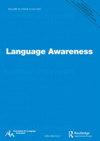Investigating novice EFL writing teachers’ beliefs and practices concerning written corrective feedback across contexts: a case study from a complexity theory perspective
IF 2.2
2区 文学
0 LANGUAGE & LINGUISTICS
引用次数: 2
Abstract
Abstract While previous research has identified misalignment of L2 teachers’ beliefs and practices on written corrective feedback (WCF), much remains to be known about whether and how writing teachers’ beliefs may vary across contexts and evolve over time, as well as the extent to which their beliefs are manifested in their practice. To address this issue, this study draws upon the perspective of complexity theory to explore the data collected in a case study of two novice Chinese EFL teachers’ changes in beliefs and practices about WCF across student-centred contexts and teacher-centred contexts. Data were collected from multiple resources, including interviews, drafts of students’ writing, and teacher on-script WCF. The data revealed a complex process of change in teachers’ beliefs about WCF that underwent distinct stages across contexts. Misalignments between teachers’ WCF beliefs and practices and possible reasons for these differences (e.g. teacher professional identity, affective factors, and individual student differences) are also discussed. This study deepens our understanding of writing teachers’ complex beliefs about feedback practices and sheds new light on feedback pedagogy in L2 writing classrooms.从复杂性理论的角度考察英语写作新手教师对跨语境书面纠正反馈的信念和实践
摘要尽管先前的研究已经发现二语教师在书面纠正反馈(WCF)方面的信念和实践不一致,但关于写作教师的信念是否以及如何在不同背景下变化并随着时间的推移而演变,以及他们的信念在实践中的表现程度,还有很多未知之处。为了解决这一问题,本研究从复杂性理论的角度出发,探讨了两位中国英语新手教师在以学生为中心和以教师为中心的环境中对WCF的信念和实践的变化的案例研究中收集的数据。数据是从多种资源中收集的,包括访谈、学生写作草稿和教师关于脚本WCF。数据显示,教师对WCF的信念发生了复杂的变化过程,在不同的背景下经历了不同的阶段。还讨论了教师WCF信念和实践之间的不一致,以及这些差异的可能原因(如教师职业身份、情感因素和个体学生差异)。本研究加深了我们对写作教师对反馈实践的复杂信念的理解,并为二语写作课堂中的反馈教学法提供了新的视角。
本文章由计算机程序翻译,如有差异,请以英文原文为准。
求助全文
约1分钟内获得全文
求助全文
来源期刊

Language Awareness
Multiple-
CiteScore
3.70
自引率
10.00%
发文量
18
期刊介绍:
Language Awareness encourages and disseminates work which explores the following: the role of explicit knowledge about language in the process of language learning; the role that such explicit knowledge about language plays in language teaching and how such knowledge can best be mediated by teachers; the role of explicit knowledge about language in language use: e.g. sensitivity to bias in language, manipulative aspects of language, literary use of language. It is also a goal of Language Awareness to encourage the establishment of bridges between the language sciences and other disciplines within or outside educational contexts.
 求助内容:
求助内容: 应助结果提醒方式:
应助结果提醒方式:


